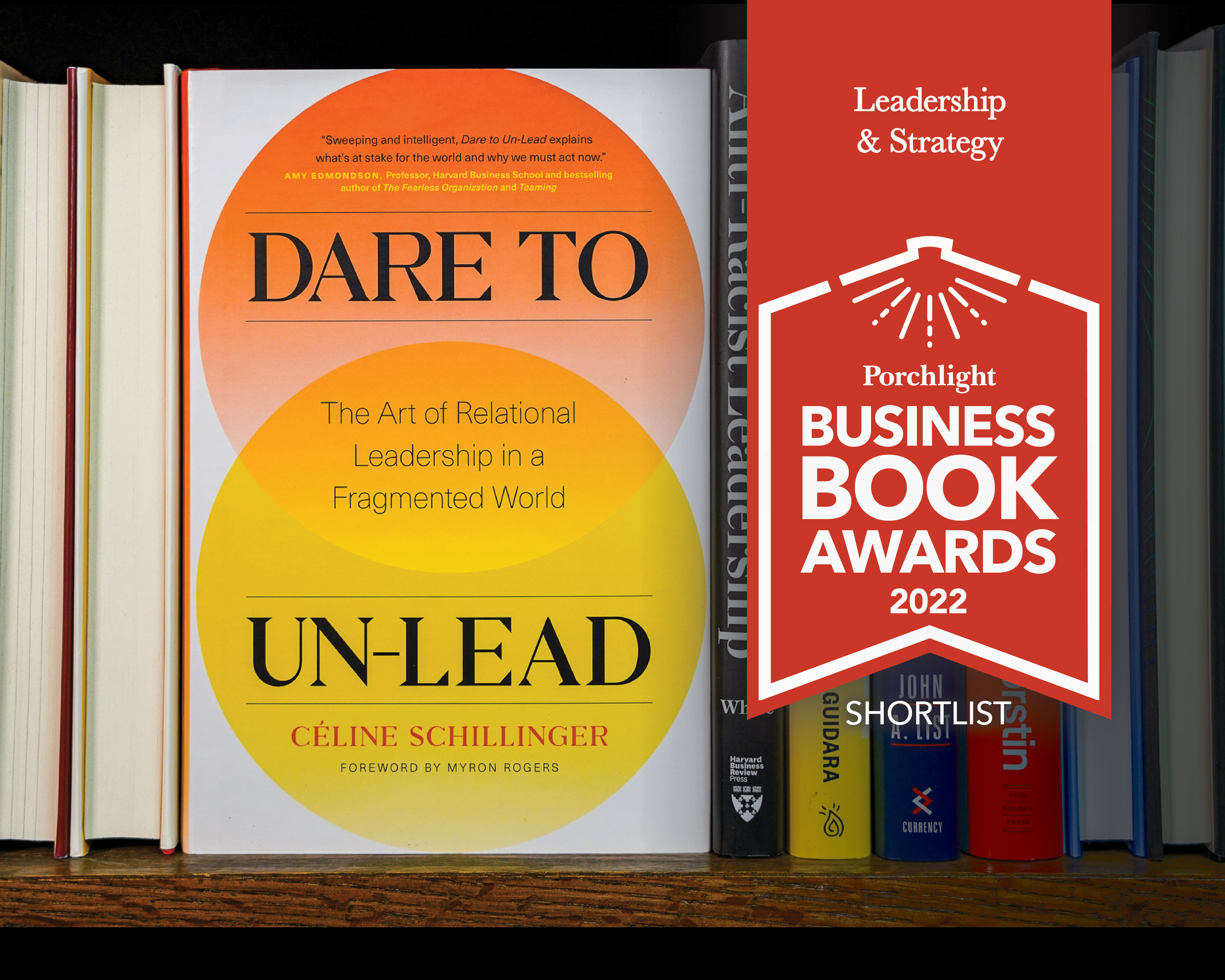Dare to Un-Lead | An Excerpt from the 2022 Porchlight Leadership & Strategy Book of the Year
As our Managing Director Sally Haldorson recently wrote:
Owing to her native country of France, Schillinger introduces readers to a refreshing new vocabulary with which to rethink how we think about leadership. And, sometimes, to break us out of old habits, new words are just the trick. She writes, “Leadership is broken. But it doesn’t have to be that way. We can transform leadership through three core values: those of Liberty, Equality, and Fraternity.”
The following excerpt is the book's Preface, and introduces how those three core values can be used by organizations to reinvent themselves.
 My late maternal grandmother, Lucienne, was born in Calais, France, in 1907. She was the daughter of a lighthouse keeper who was a father to twenty-one children—eleven with his first wife and, after she died, ten more with my great-grandmother. The children were so numerous and so spread out my grandmother told me she often forgot the names of her half-siblings.
My late maternal grandmother, Lucienne, was born in Calais, France, in 1907. She was the daughter of a lighthouse keeper who was a father to twenty-one children—eleven with his first wife and, after she died, ten more with my great-grandmother. The children were so numerous and so spread out my grandmother told me she often forgot the names of her half-siblings.
Lucienne was seven years old when she started school, but soon stopped because of the First World War; by nine she was working to help the family make ends meet. Child labor in France was prohibited in 1874 but was still quite common in factories like the one that made lace where my grandmother worked. There she and the other children would do jobs that, because of their relatively small scale, were simpler for them. My grandmother’s job was to crawl under the lace machinery to pick reels and thread that had fallen. I recall her telling me that the forewoman would lock her and the other child workers in the toilets on the days the labor inspector came to the factory.
By her early twenties, Lucienne was already a veteran wheeler at the factory. She kept on working hard and became a cleaner for well-off families after she and her husband moved to Bordeaux in the southwest of France.
Her experience of work and life couldn’t be more dissimilar to mine. I was born and raised in a small town near Bordeaux, France, in a stable and loving family. My parents, both young art teachers, had met in art school a few years before. I’m the eldest of three daughters. My mother was the first of her extended family to attend graduate school. My father’s family, with roots in Alsace near Germany, belonged to the lower middle class. Both my parents enjoyed a simple but joyful childhood in a country recovering bit by bit from the Second World War. From an early age, my father enjoyed freedoms that would shock today—hitchhiking across Europe, for example, at the age of fifteen.
My parents were always curious, creative humanists. Together, they traveled the world, visiting close to a hundred countries in the simplest way possible, meeting and interacting with the locals. Since they retired, they have spent several months each year in remote locations around the globe, helping educational charities. My mother is a talented portrait photographer. Her hands are always at work; she cannot stop creating and never seems to tire. My father is also a maker, passionate about manual crafts that demand effort and precision, full of admiration for master artisans. He seems able to do anything.
This is the environment that I was lucky to grow up in: creative, stimulating, free-spirited, open to the world, not rich but financially secure. It was egalitarian, too. My parents shared the same profession, as well as the household chores. With no brother to compete with, we sisters grew up taking women’s rights for granted. For quite some time, there was nothing in my personal experience to disprove this worldview. Opportunities came my way and I grabbed them.
However, when thinking about leadership, societal change, and the contents of this book, my mind travels back to my grandmother’s life. Being reminded of the hardships she endured as a natural course of the life she led at the time she led it compels me to not squander the opportunities life has given me, and it keeps me connected to the hardship of labor still experienced today by many people across the world.
While child labor persists in some underdeveloped nations, in the West it is largely considered a tool of a bygone era; a tool which no longer serves us well. Across industrialized nations it was recognized that by educating children, we would, collectively, get further ahead. What got us through the beginning of the Industrial Revolution would not work to get us where we envisioned ourselves in the future, and so, we adapted.
Similarly, and much more recently, I’ve recognized a global need to adapt from traditional models of leadership to something that will propel us forward with new collective work practices that respect people and drive economic growth.
Unfortunately, many dominant leadership and management practices still in use around the world today are inherited from scientific management theory and its derivatives. These revolutionized manufacturing and enabled great business outcomes throughout the twentieth century and were gradually adopted by other fields, from education to sport. But the context in which we now live, trade, and work in the twenty-first century has little in common with that of Frederick Taylor or Henry Ford. The anachronism of their approach has fueled growing dissatisfaction about how decisions are made, how corporations are run, and how our societies function.
As globalization and technology accelerate, and as our values and social norms—especially those related to traditional hierarchies and authority—evolve, the business world needs to keep pace. Value creation has profoundly shifted in recent years, as have consumer expectations. All of this is pushing organizations to reinvent themselves. A new mode of leadership will need to be at the forefront of this change if it is to be sustainable and positively impactful on society.
And it is possible. A leadership model that is more respectful of people, while generating greater economic value, is within reach. There is no need for complicated methods; three universal values provide the pathways to reinventing leadership. They are Liberty, Equality, and Fraternity.
Liberty
Far from being an obstacle to the smooth running of an enterprise, Liberty is an accelerant. It allows people to exercise judgment, escape the pitfalls of arbitrariness, and develop their agency. Collective freedom begins with the emancipation of the individual, a transformational experience that is undergone by anyone who aspires to change agency. To extend freedom at scale, a different kind of leadership is required, putting new and sometimes counterintuitive principles at the heart of managerial practices.
Equality
Inequalities in status and access to information, domination relationships, and obedience have become obstacles to the performance of organizations. A semblance of equality cannot mask the difficulties organizations face when dealing with the diversity of people. Yet there is a phenomenal opportunity before us in the shape of networks, as well as the technology and human relationships that enable them. Networks, as organizational design principles, allow for new, highly effective collective work practices, replacing domination with peer leadership that has the capacity to inspire agility and innovation.
Fraternity
Fraternity is a challenge in a contemporary society marked by individualism, distrust, and competition. This is about so much more than teambuilding and efficiency. To focus on that alone will deliver no more than superficial results. True fraternity stems from a shared commitment to a common cause in an activist movement. Activism—its psychological drivers, its engagement mechanisms, its tools—offers organizations and leadership an immense opportunity to progress. Corporate activism enables the formation of communities based on intent and impact. These are two key drivers of human and economic performance that can activate the radical reinvention of leadership.
Dare to Un-Lead explores the opportunities we have to collectively transform leadership through the personal experiences I have had in working with others to plot and test people-focused, digitally enabled, collective work practices. All of them have been internationally recognized for their ability to engage people and transform business outcomes for broader social good. I wanted to understand why they worked and how they could be expanded to more organizations. This book is the result of a deep analysis of leadership, studied through multiple lenses, timely sources of knowledge, and a set of universal principles. The result is an offering of original insights and evidence-based pathways for reinventing collective performance in a post-pandemic world. This book will assist those looking to perform better individually and collectively and who desire to be agents of permanent change in leadership and governance. From large corporations to small businesses, the lessons learned here, implemented individually and collectively over time, will make our workplaces more equal, our jobs more gratifying, and our economies more profitable. And that will make the world a better place.
Excerpted from Dare to Un-Lead. Copyright © 2022 by We Need Social.
Published by Figure 1. All rights reserved.
ABOUT THE AUTHOR
Céline Schillinger is an award-winning entrepreneur, change agent, and consultant. She has over 30 years of field experience, working with both small and global organizations across several continents. A solid track record on transformation informs Céline's vision of change, engagement, and leadership. A blogger since 2013 and an acclaimed public speaker, she was knighted in 2017 in her native France for her workplace change efforts.



